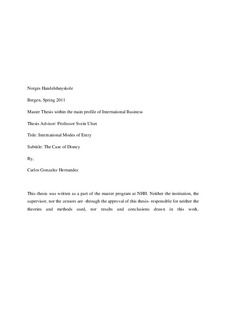| dc.contributor.author | Gonzalez Hernandez, Carlos | |
| dc.date.accessioned | 2011-10-05T09:29:41Z | |
| dc.date.available | 2011-10-05T09:29:41Z | |
| dc.date.issued | 2011 | |
| dc.identifier.uri | http://hdl.handle.net/11250/168935 | |
| dc.description.abstract | The case of Disney’s theme parks represents an opportunity to test major internationalisation theories in a setting of large investments with little chance for reversal of commitments. The purpose of the research is to study the benefit of different entry modes dependent on Disney’s Theme Parks value-generating resources and capabilities while conditioned to certain local industrial and institutional conditions in foreign markets.
Five major theories and frameworks were used to analyze all four Disney’s ventures abroad. This resulted in 20 individual hypotheses analyzed. Results indicate that Disney followed a predictable internationalisation process in the cases of Tokyo, Hong Kong and Shanghai, but that it went off-path in the Paris one. In successful cases Disney followed a cautious approach, involving local partners to transfer and adapt the “Disney Experience”. In the case of Paris the company decided to enter the market alone, which neglected the unique needs of the local market. | en |
| dc.language.iso | eng | en |
| dc.subject | international business | en |
| dc.title | International modes of entry : the case of Disney | en |
| dc.type | Master thesis | en |
| dc.subject.nsi | VDP::Samfunnsvitenskap: 200::Økonomi: 210::Bedriftsøkonomi: 213 | en |
